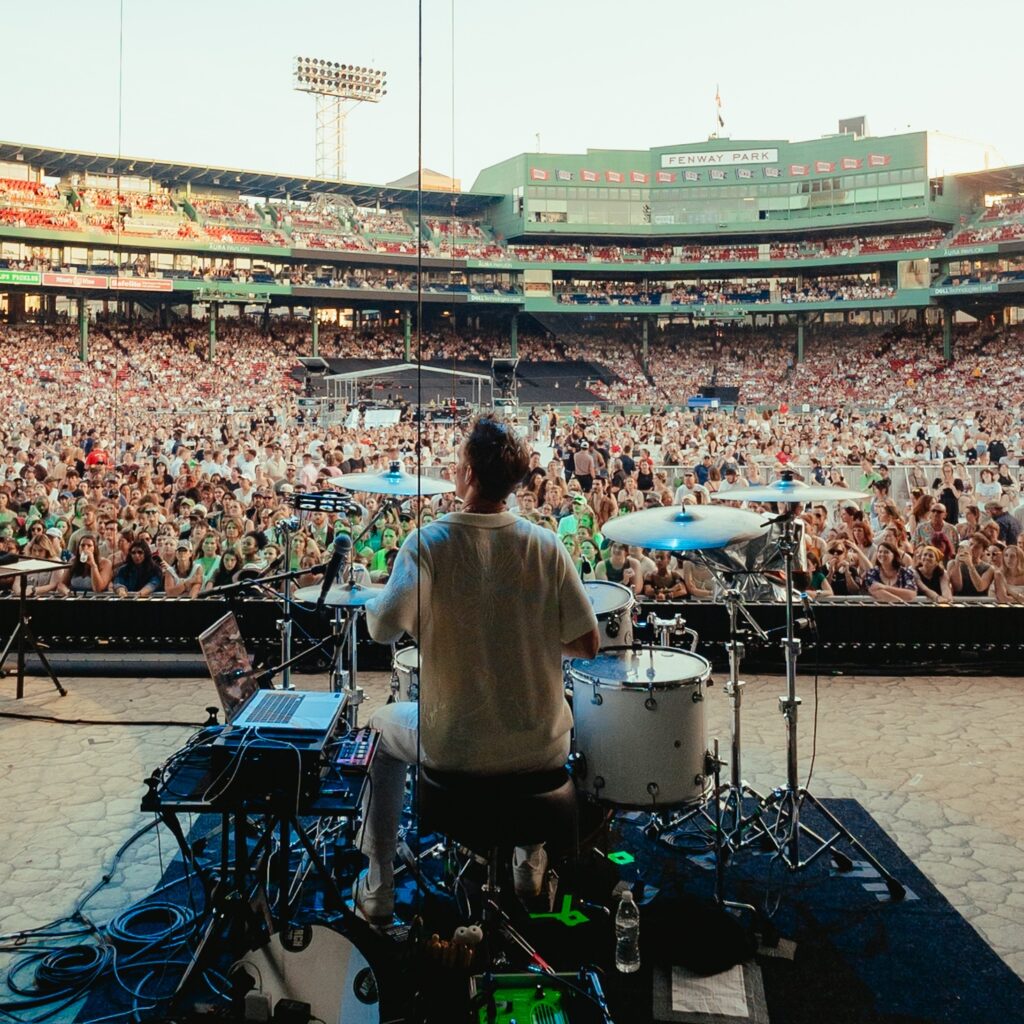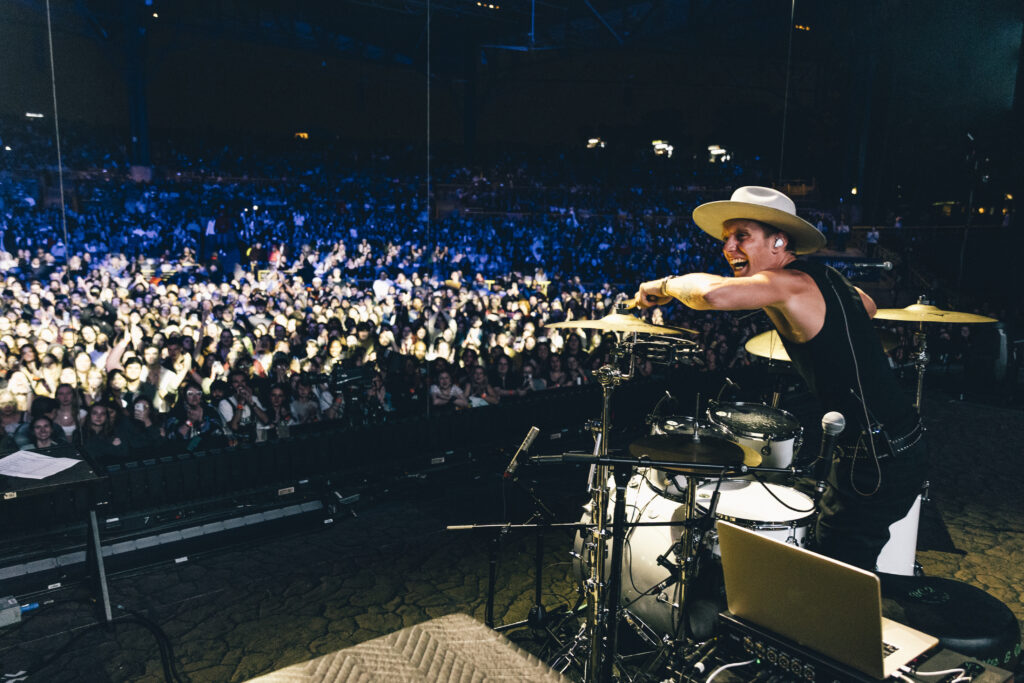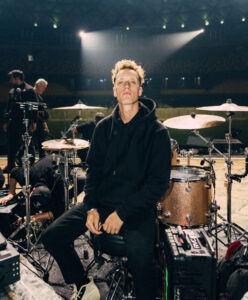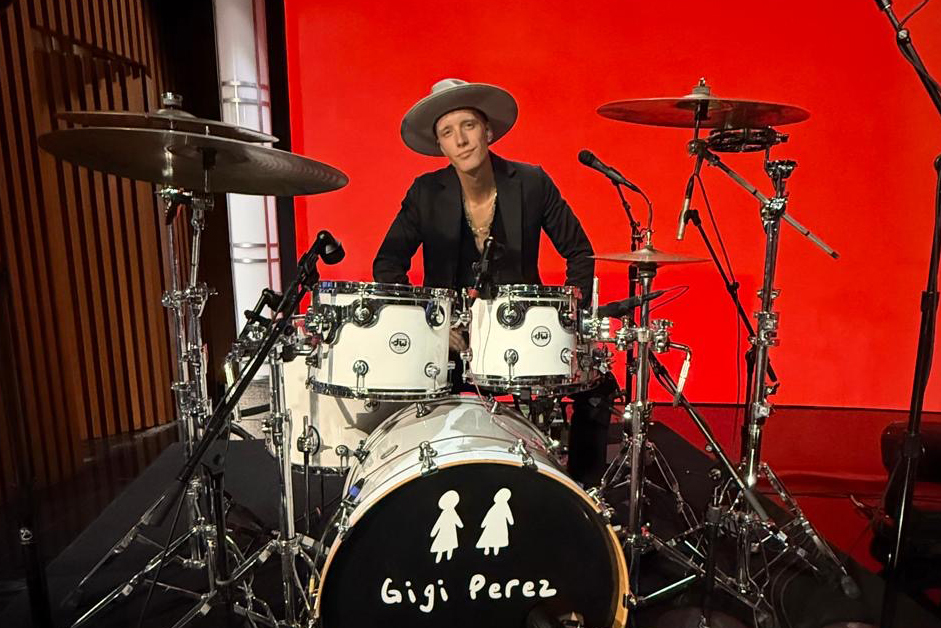JayJay Drums on Growing with Artists, Big Stages, and Lasting Tours
Interview by Antoine Fadavi
7 minute read
Meet JayJay Drums—a drummer and music director known for his work with Gigi Perez and his adaptability on the pop touring circuit. From festival stages like Lollapalooza and Hyde Park to intimate club shows, JayJay shares how he scales with artists on the rise, balances studio precision with live energy, and what it really takes to land and keep major tours.
When working for an artist that’s on the rise, how do you scale your drumming and music direction skills and efforts as they move up to bigger stages?
First and foremost, it’s a tremendous privilege to grow alongside an artist over time and to reach new heights together. I’ve been fortunate to experience this a few times in my career, and I never take it for granted. As both a musical director and drummer, my mindset has always been to anticipate the next step, before it actually arrives. When an artist is on the rise, the trajectory can shift quickly. You might be preparing for an intimate club tour, and just a few months later find yourself doing national TV appearances or playing main stages at some of the world’s biggest festivals. That’s why it’s essential to keep the bigger picture in mind, whether in arrangements, band lineup, or production choices. I always try to stay a step ahead, and I’m never afraid to think big when it comes to building an artist’s live show.
How does your approach differ regarding arrangements and live production when playing festivals like Lollapalooza or Hyde Park versus a club show?
I always take into account the size of the crowd and the way the audience is responding. The energy you receive from 70,000 people on a main stage at Lollapalooza is entirely different from the intimacy of a club show. At festivals, audiences are often there for the entire day, seeing multiple artists back-to-back. The sets tend to be more high-energy, and many people in the crowd may be hearing your music for the first time. I see those festival slots as an opportunity to win over as many new listeners as possible, to make a powerful impression and deliver a dynamic, high-impact performance for both fans and first-timers. Club headline shows, on the other hand, are a completely different mindset. You have the time and space to take the audience on a full journey, to tell the artist’s story through the setlist, the transitions, and the emotional highs and lows of the performance.

Photo Credit: Faith Nguyen
For stadiums versus smaller venues, what are the biggest adjustments you make in your drumming specifically?
My mindset has always been to play just as much for the person sitting 400 feet away at the top of the stadium as for the one right up front at the crash barrier. In larger venues, I definitely find myself lifting my hands higher and accentuating my movements to make sure the energy reaches every corner of the space. Stage presence matters, your energy on stage should support the artist, especially when they turn around and look to the band. At the same time, there are things that never change, no matter the size of the venue. Locking in with the band and staying in the pocket will always be essential.
How do you balance your drumming staying true to the record with adding live energy, especially in the pop world?
Great topic. For me, the goal is always to serve the music first, stay in the pocket, lock in with the band, and then bring my own flavor and energy to the performance. Every drummer has their own unique voice, and that individuality is what makes each of us valuable. If I’m playing just drums, I still want to contribute creatively—bringing ideas to the table for the musical director to consider. At the end of the day, people are buying tickets to see a show. It should feel like an elevated version of the album, bigger, more dynamic, while still honoring the essence of the original music.
What challenges did you face moving from France to the U.K., then again to the U.S. in terms of building your music circle/community and finding work?
Visiting a country and actually moving there are two very different experiences. When you relocate, it’s important to take the time to observe, be present, and truly understand how things work. There were people living there long before you arrived, and I believe in respecting the existing dynamics of any new place. I always try to build genuine relationships, and I know that takes time. You have to be okay with the fact that some people will help you a lot, while others simply won’t, and that’s part of the process. Honestly, that’s what motivates me. There’s nothing more exciting than moving to a new city, exploring its scene, and meeting the people who give it its unique energy and vibe.
What do MDs and artists look for beyond just drumming ability when deciding who to hire for a drummer?
Skills and timing are obviously essential in pop music, especially for me as a drummer. But beyond that, I pay close attention to personality and individual flavor. I want someone who can truly match the artist’s energy and vibe on stage. Depending on the scale of the tour, stage presence becomes just as important. That’s one of the reasons I love drummers, we all have our own unique sound and character. Building a band is like crafting a great recipe: it needs the right balance of flavors and spices to really work. So let’s not be afraid to be ourselves, that individuality is what brings a performance to life.

What were some early misconceptions you had about touring in the pop world, and what are some things you learned on the road that have surprised you?
Over the past 10 years of touring internationally, I’ve learned that the hang, the time spent connecting and socializing offstage, is crucial to surviving the long months on the road. Touring can be exhausting, and you end up living with the same group of people 24/7. In fact, you often spend more time hanging out than actually playing drums. These moments matter, not just for you, but for everyone around you. Being able to socialize while also staying true to yourself is key to maintaining happiness and delivering a great show night after night.
If you could give one piece of advice to drummers trying to make it onto major tours, what would it be?
Humility. Staying humble and always being open to learning from the musicians and crew who’ve already been part of these tours has been essential for me. There are so many talented people out there who genuinely love what they do and are willing to share their knowledge and experience. I’ve never hesitated to ask questions, whether it’s a drummer, a tour manager, or a musical director and I’ve sat and watched the same headliner every night for 25 shows straight just to learn. I remember watching Neal Daniels perform with LP every night on a tour where I was the opening act. I absorbed so much just by observing him, and the advice he gave me still sticks with me today, now that I’m playing on major stages myself.
Thank you, JayJay!
Find JayJay Drums on his website, Instagram, and YouTube.



